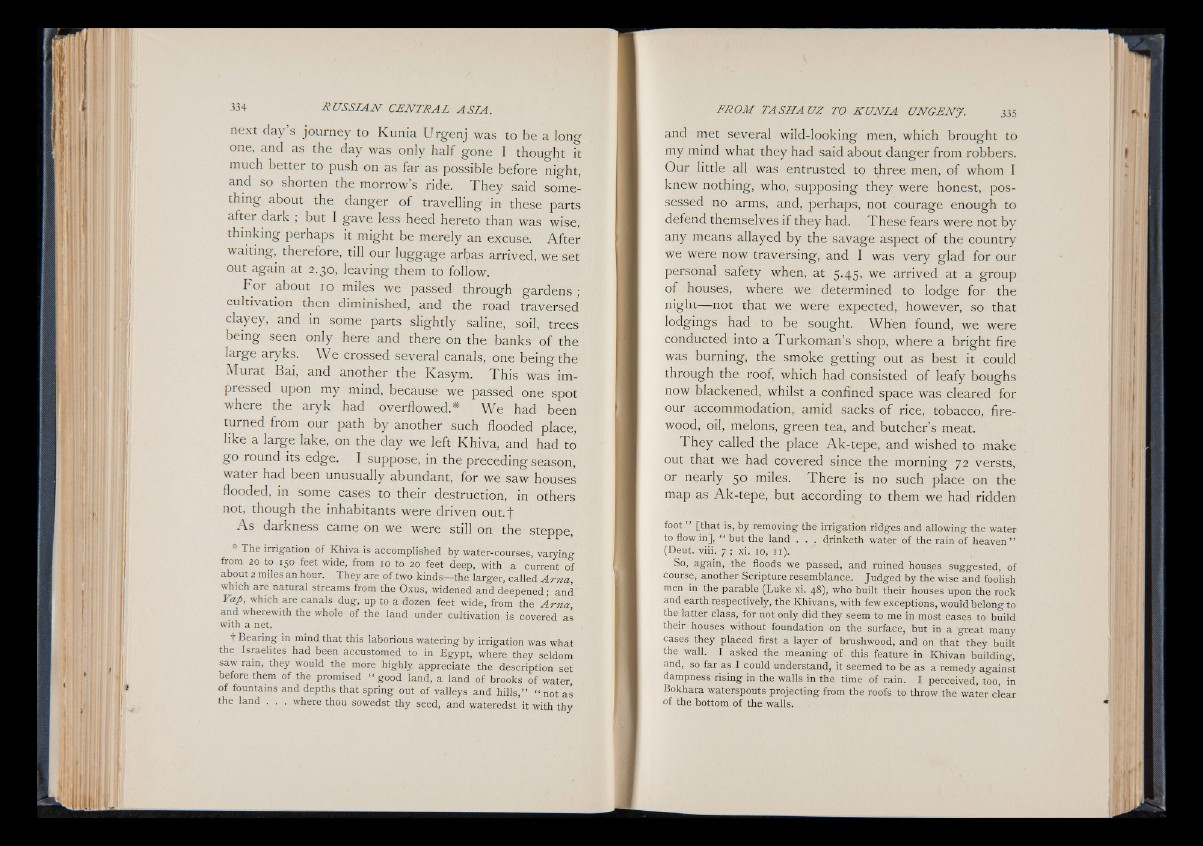
next day’s journey to Kunia Urgenj was to be a long
one, and as the day was only half gone I thought it
much better to push on as far as possible before night,
and so shorten the morrow’s ride. They said some-
thing about the danger of travelling in these parts
after dark ; but I gave less heed hereto than was wise,
thinking perhaps it might be merely an excuse. After
waiting, therefore, till our luggage arlpas arrived, we set
out again at 2.30, leaving them to follow.
For about 10 miles we passed through gardens ;
cultivation then diminished, and the road traversed
clayey, and in some parts slightly saline, soil, trees
being seen only here and there on the banks of the
large aryks. We crossed several canals, one being the
Murat Bai, and another the Kasym. This was impressed
upon my mind, because we passed one spot
where the aryk had overflowed.* We had been
turned from our path by another such flooded place,
like a large lake, on the day we left Khiva, and had to
go round its edge. I suppose, in the preceding season,
water had been unusually abundant, for we saw houses
flooded, in some cases to their destruction, in others
not, though the inhabitants were driven out.t
A s darkness came on we were still on the steppe,
° The irrigation of Khiva is accomplished by water-courses, varying
from 20 to 150 feet wide, from 10 to 20 feet deep, with a current of
about 2 miles an hour. They are of two kinds—the larger, called Arna
which are natural streams from the Oxus, widened and deepened; and'
Yafi, which are canals dug, up to a dozen feet wide, from the Arna
and wherewith the whole of the laud under cultivation is covered as
with a net.
f Bearing in mind that this laborious watering by irrigation was what
the Israelites had been accustomed to in Egypt, where they seldom
saw rain, they would the more highly appreciate the description set
before them of the promised “ good land, a land of brooks of water,
of fountains and depths that spring out of valleys and hills,” “ not as
the land . . . where thou sowedst thy seed, and wateredst it with thy
and met several wild-looking men, which brought to
my mind what they had said about danger from robbers.
Our little all was entrusted to three men, of whom I
knew nothing, who, supposing they were honest, possessed
no arms, and, perhaps, not courage enough to
defend themselves if they had. These fears were not by
any means allayed by the savage aspect of the country
we were now traversing, and I was very glad for our
personal safety when, at 5-45» we arrived at a group
of houses, where we determined to lodge for the
night— not that we were expected, however, so that
lodgings had to be sought. When found, we were
conducted into a Turkoman’s shop, where a bright fire
was burning, the smoke getting out as best it could
through the roof, which had consisted of leafy boughs
now blackened, whilst a confined space was cleared for
our accommodation, amid sacks of rice, tobacco, firewood,
oil, melons, green tea, and butcher’s meat.
They called the place Ak-tepe, and wished to make
out that we had covered since the morning 72 versts,
or nearly 50 miles. There is no such place on the
map as Ak-tepe, but according to them we had ridden
foot ’ ’ [that is, by removing the irrigation ridges and allowing the water
to flow in], “ but the land . . , drinketh water of the rain of heaven”
(Deut. viii. 7 ; xi. 10, 11).
So, again, the floods we passed, and ruined houses suggested, of
course, another Scripture resemblance. Judged by thé wise and foolish
men in the parable (Luke xi. 48), who built their houses upon the rock
and earth respectively, the Khivans, with few exceptions, would belong to
the latter class, for not only did they seem to me in most cases to build
their houses without foundation on the surface, but in a great many
cases they placed first a layer of brushwood, and on that they built
the wall. I asked the meaning of this feature in Khivan building,
and, so far as I could understand, it seemed to be as a remedy against
dampness rising in the walls in the time of rain. I perceived, too, in
Bokhara waterspouts projecting from the roofs to throw the water clear
of the bottom of the walls.